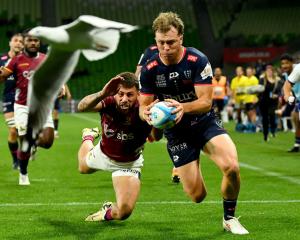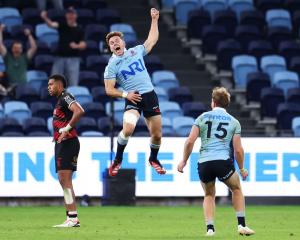New Zealand
2013 was an improvement on 2012 for the All Blacks, the side looking far more polished and capable of playing longer periods of good rugby. Once again they went through unbeaten and were forced to do so against some tougher opposition this year, notably a vastly improved Springbok team.
Perhaps the most encouraging thing was the amount of depth the side showed, having developed some good young talent. Four first five-eighths were used, all of whom looked good, attacking the line dangerously and kicking well. Steven Luatua showed he had a high enough work rate to play this level, Charlie Faumuina came on towards the end, while Charles Piutau grew into his role and was threatening.
The backline looked reasonably slick on attack and was generally safe on defence, while the forwards met their opponents with physicality and improved vastly at lineout time as the competition wore on.
They remain the benchmark in world rugby, but the gap is closing and they will need to keep on getting better should they want to remain the world's best team.
South Africa
The Springboks were the most improved team of the Rugby Championship, taking great strides after a rather indifferent 2012. They were predictable for the most part, concentrating on the physical contest and looking to smash teams up front. It was this that made them so foreboding and gave them a good platform to work off.
Early on they were perhaps guilty of too much emphasis on this area. While winning the battle up front is indeed important, it is still important to play rugby and try to score points where you can. They seemed to forget this at times and it saw points go begging.
This week they played a far more positive style of game, knowing that they needed to secure a bonus point, and looked far better for it. They were able to score four tries through running rugby, unleashing their dangerous backs which gave the All Blacks trouble on defence. Jean de Villiers was particularly dangerous in the midfield, as were Bryan Habana and Willie le Roux on the wings. If they take this lesson and use these players more in the future, they will indeed become very tough to beat.
That said, their strength still remains up front. They have a good lineout, keeping their calls simple and winning ball through the skill of their lifters and jumpers. From this they are able to launch into their rolling maul, which is their most potent attacking weapon and is almost impossible to stop when done right.
Watch out for them in 2014, they are a team on the up.
Australia
The Wallabies had a disappointing Rugby Championship and are a team in complete disarray. For the most part they could not settle on a starting line-up, which is an indicator of the talent available in the country.
However, some of the selection decisions were certainly interesting, in particular the dropping of Will Genia midway through the competition. Sure he has not had his best year, but it would seem more prudent to change what is in front of him as this seemed to be where the problem was.
The forwards simply were not giving their backs enough good ball to work with. They lacked the physicality of the All Blacks and the Springboks and consequently did not get enough go-forward. Their scrum struggled on multiple occasions too and remains a real problem area.
The spark that used to make their backs so dangerous was missing too, with no-one really threatening other than Israel Folau, who was not used nearly enough. Only in their final game did they really show any sort of flair, using some good backline moves and running well at holes.
Something needs to change, but it is hard to know what. You can only work with the players you have available and at the moment there is not much there.
Argentina
Argentina were a similar version to themselves from 2012. They remained very strong in the tight and showed that they could match anyone in close. Their defence around the fringes was good and they attacked the breakdown strongly, looking to push the opposition off their own ball.
They had arguably the best scrum in the competition, making use of this weapon and having even the All Blacks under all sorts of pressure.
But they continue to struggle out wide and in the open. It is clear that they are trying to play some rugby, but they lack the basic skills to be able to execute. Indeed whenever they make a break, nine times out of ten they seem to make a mistake through a bad pass or a dropped ball, preventing them from converting these into points. Their defence in the backs looked weak at times too, namely in the first game against South Africa and the most recent one against Australia.
It was never going to happen overnight with Argentina though and as long as they are learning and show some improvement over the next couple of years, you have to be patient. Perhaps in 2014 they will be able to notch up their first Rugby Championship win.












